Engagement Ring Guide
Welcome to the Blue Nile Guide to custom engagement rings, featuring everything you need to know to maximize sparkle—and your budget.
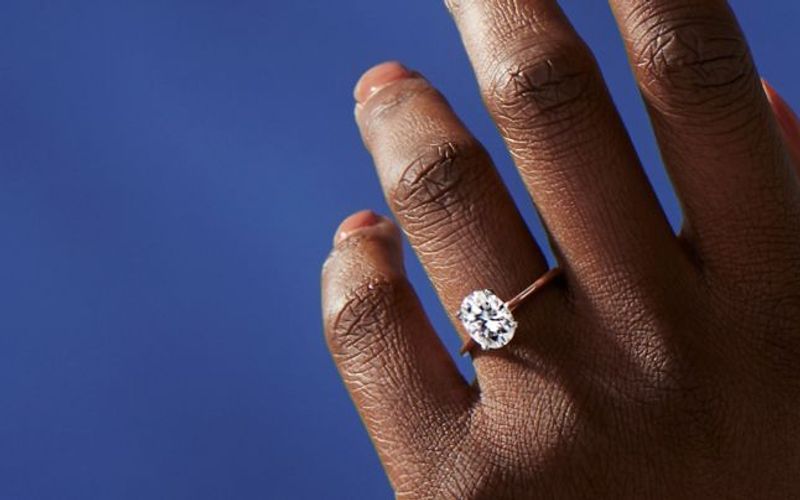
As the largest online retailer of certified diamonds and fine jewelry, we can say with confidence that you’ve come to the right place. Our selection, quality and expertise are unsurpassed. We’re here to help you design an engagement ring that reflects your intentions, your budget, and basically everything and anything that matters most to you.
What Does An Engagement Ring Symbolize?
An engagement ring has long symbolized a proposal of marriage, and our Instagram feed is full of these magic moments. You know the ones, right? Where excited, and slightly nervous, proposers are down on one knee. The meaning of an engagement ring speaks volumes: It’s a clear and tangible symbol that you are beloved, and that the person presenting the ring wants to make your relationship official.
While any ring can be considered an engagement ring, by far the most popular engagement ring contains a diamond. Of course, the sky’s the limit when it comes to finding your perfect ring. There are no rules—and that includes, what finger the engagement ring is worn on. Traditionally in Western cultures, an engagement ring is worn on the third finger of the left hand, and, like a wedding ring, it’s a clear and very visible way to indicate that you’re in a relationship. However, some cultures wear engagement rings on the right hand, because the left hand is considered unlucky. What feels right to you? However you celebrate, we’re here to help make it happen.
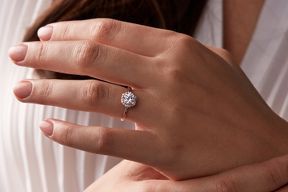
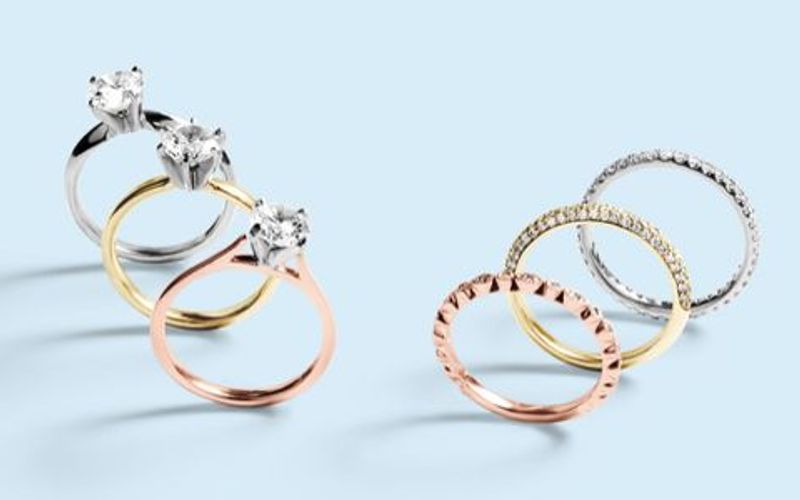
The Difference Between An Engagement Ring And A Wedding Ring
Traditionally, an engagement ring is what’s presented during a marriage proposal and a wedding ring is what partners give to each other during the wedding ceremony. It’s also common for an engagement ring to be more ornate than a wedding ring. One of our best selling combinations is a round diamond solitaire engagement ring paired with a diamond pavé wedding band. On the flipside, we have many customers who love to turn tradition on its head: some customers forgo the engagement ring altogether and choose matching bands. Other couples double up on sparkle, with stacking rings that bookend the engagement ring.
If you are planning to exchange wedding rings, you might wonder where to wear your engagement ring on your wedding day? Many people temporarily shift their engagement ring to their right hand on the day of the ceremony for safekeeping.
How Much Should You Spend On An Engagement Ring?
The old adage about spending three months’ salary on your engagement ring is nothing more than that—and old adage that doesn’t necessarily line up with your priorities, needs or personal budget. (And that, after all, is what’s important.) And while it may be helpful to know that the average engagement ring cost in the United States is $5,900 according to a survey conducted by The Knot, what really matters is that Blue Nile offers incredible values and engagement ring prices that suit your comfort zone. Our experts are passionate about helping you make the most of every dollar whether your ring is $1,000 or $10,000.
We know from working directly with millions of customers and conducting surveys of our own, that there’s a tremendous amount of anxiety around saving up for and financing an engagement ring—especially among Gen Z and Millennials. So with that in mind, we’ve partnered with a savvy financial expert and put together tips that can help you smartly budget and save.
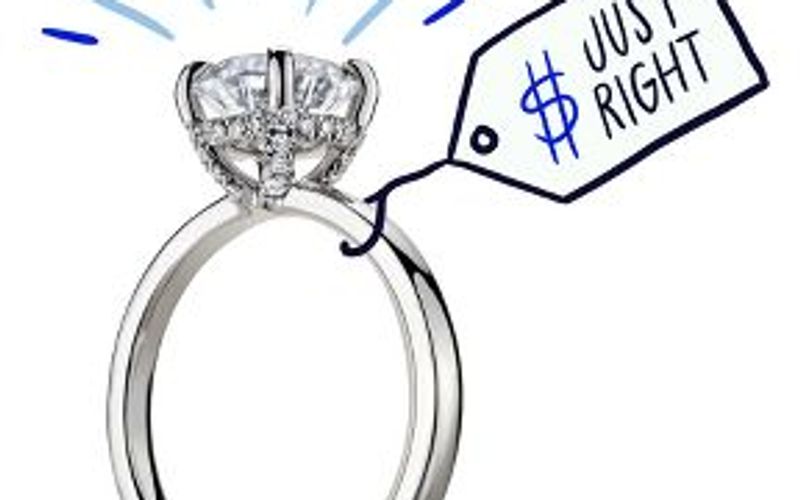
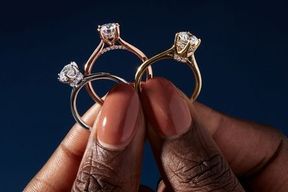
Popular Metals Used In Engagement Rings
A popular engagement ring metal among Blue Nile customers is definitely platinum (or white gold for people who want a platinum-look at a lower cost). Over the last few years, however, rose gold engagement rings are a fast-rising trend. Rose gold was often used in settings in the late nineteenth century, and is appreciated today for its naturally romantic appeal that particularly suits rings with vintage-inspired styles. Most recently, yellow gold engagement rings are capturing the attention of people who appreciate the way this metal’s beautiful warm glow complements engagement ring settings with colored gemstones.
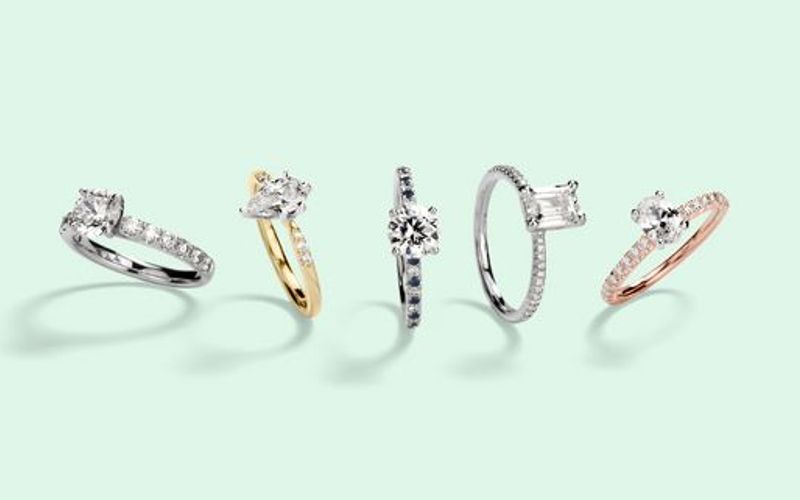
Popular Engagement Ring Settings And Styles
Technically the terms settings and styles mean different things. A craftsperson working on a custom engagement ring in the Blue Nile workshop will likely use the term setting when referring to the technique that’s used to set a diamond in place. Prong-style settings and bezel settings are just a few examples of setting styles in the head of a ring. There are also settings, including channel-set styles, that describe the way stones are set into the body of the ring.
But not everyone uses the term “setting” in quite the same way. At Blue Nile, we often use the term conversationally rather than technically to mean the overall style of ring in which your diamond(s) or gemstone(s) will be set.
Explore Some Popular Engagement Ring Styles From Blue Nile
Choosing The Right Diamond For You
It’s likely that the first thing that you’re going to run across when you start researching diamond engagement rings is a mention of the 4Cs (cut, color, clarity and carat.) Trying to master the nuances of these principles might even make you feel overwhelmed. But don’t worry. We have experts with years of experience who can help you find the perfect diamond based on your budget and style. That said, if you love to deep dive into the nitty gritty, we also have great resources that will help you navigate the nonsense and quickly master the basics.
But before you check out more of our awesome education section, we’ll answer two things that everyone always wants to know. What is the most important of the four Cs? Answer: Cut. And, How many carats should an engagement ring be? Answer: Our best seller with a single center stone averages out to slightly under 1.0 carat. Of course, that doesn’t mean that your diamond needs to be that weight, but people have told us it’s helpful to have a benchmark. If you’re curious why cut is so important, it’s because a great cut will give you the most sparkle. Carat weight, however, is not related to how well a diamond reflects light.
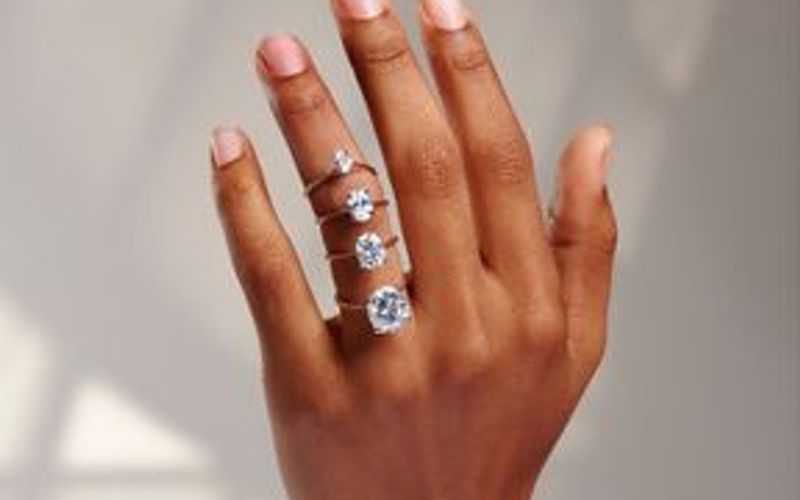
Why Do People Love Fancy-Shaped Diamonds?
There are many details that go into creating a beautiful engagement ring, but it’s probably no surprise that a major factor defining the look of our most popular engagement ring styles is the shape of the diamond centerstone. In addition to round diamonds we offer nine fancy shapes including pear, oval and emerald.
People love fancy-shaped diamonds because they are a stunning way to create a truly distinctive design. As an added bonus, many fancy-shaped diamonds can save you up to 25% over a round brilliant diamond of an equal carat weight. Plus, many of the fancy shaped diamonds are well suited to vintage-inspired designs. So if you’re interested in customizing a ring to create an heirloom-like feeling or you just want a style that’s uniquely you, a fancy-shaped diamond may be a great way to go.
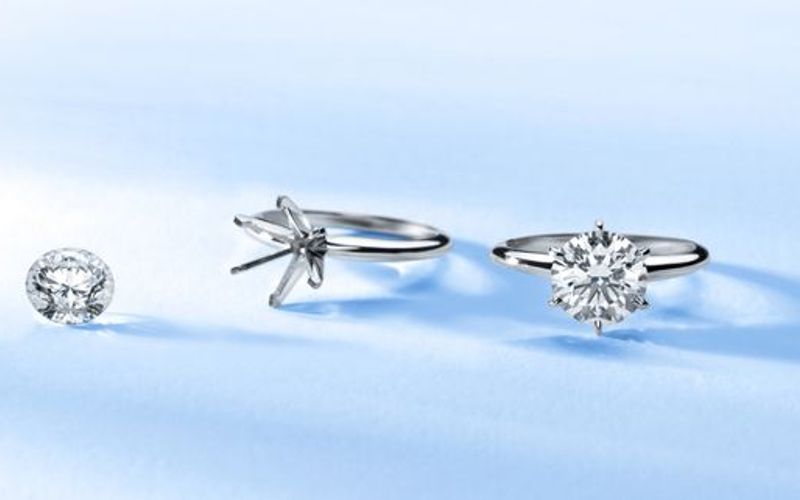
How To Customize Your Engagement Ring With Blue Nile
Our customers tell us that they love our quality, selection, above-and-beyond service and so much more. But the thing that really makes our customers happy is the ability to create absolutely any style of ring imaginable. Whatever you can dream up, we can help you design. Every engagement ring is handcrafted by an exceptional team of artisans in our Seattle workshop—and then quadruple-checked before it goes out the door. Ready to find your perfect ring?
Finding Your Ring Size
We have some great tips and tools for how to measure your ring size. The first method explains how to figure out your ring size with our printable guide and a ring that you already own as a point of reference. The second option is the most accurate, but requires a little bit of patience as you'll need to order our free ring sizer. (Both options are available via the link below.)